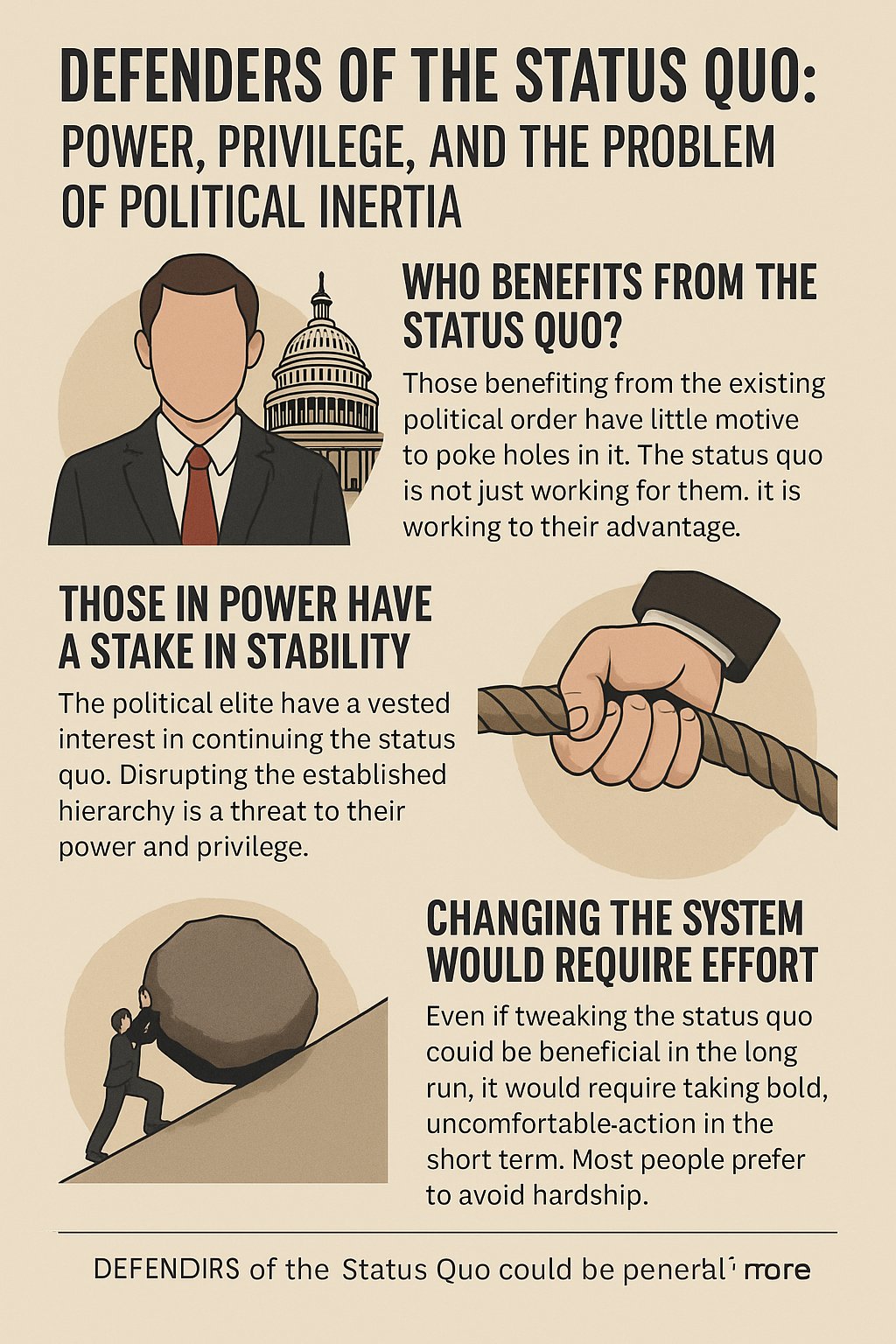Introduction: The Iron Grip of Stability
Throughout history, one truth has remained constant: those who benefit from the existing order rarely seek to reform it. Whether monarchs in feudal Europe, entrenched bureaucrats in bloated empires, or political party elites in modern democracies, the pattern is the same. The deeper one’s stake in the system, the harder one fights to preserve it—even if it is broken, unjust, or in decay.
This principle casts a shadow over the conduct of political figures like Rob Axson and those who rally behind him. While Axson may outwardly claim to represent reform, integrity, and constitutional fidelity, many observers remain suspicious that his true role is not that of a revolutionary but of a gatekeeper. A man tasked, whether by intention or inertia, with managing dissent rather than empowering it.
Comfort in Power: Why Change Is Rare Among the Influential
Change is costly. It demands risk, humility, and the willingness to question the very system that elevated you. Few in positions of privilege possess such courage. Instead, we often see:
- Token gestures meant to placate critics
- The language of reform masking policies of stasis
- Suppression of dissent under the guise of maintaining unity
For individuals like Axson, who ascend through party ranks and institutional channels, true disruption is more threat than promise. They inherit a framework designed to filter out radical voices while rewarding loyal managerialism.
The Role of Controlled Opposition
In a system where frustration simmers beneath the surface, political establishments often employ what’s called controlled opposition. These are figures who speak the language of the people—liberty, reform, accountability—but ultimately steer energy back into safe, predictable, and ineffective channels.
Such actors:
- Validate grievances without addressing root causes
- Neutralize movements by redirecting them into bureaucracy
- Offer symbolic victories while systemic problems persist
Skepticism of Axson and his supporters may stem from this historical precedent. Are they genuine agents of change—or are they maintaining appearances while the deeper structures of political dysfunction remain untouched?
The Rhetoric-Reality Gap
Too often, political figures adopt the language of reform while refusing to confront the entrenched interests they rely on. This gap between rhetoric and reality widens public mistrust.
Axson, like many within modern political leadership, must answer critical questions:
- Where has he challenged the corruption of party machinery?
- What reforms has he proposed that actually reduce centralized power?
- Has he stood up to cronyism, government overreach, or judicial activism?
If the answers are vague or symbolic, the conclusion becomes clear: the goal is continuity, not change.
The Cost of Inaction: A Cycle Repeated
Tytler’s Cycle warns that democracies move from liberty to complacency, from abundance to apathy, and eventually to bondage. When those in power fail to disrupt this trajectory, they enable it.
Citizens often misplace their trust in party insiders—believing that someone close to the system can fix the system. But insiders rarely dismantle the machines that built them.
In truth:
- You can’t reform tyranny from its throne.
- You can’t drain the swamp if you fear losing the boat.
- You can’t champion liberty while enforcing conformity.
What Real Reform Requires
True reformers are often marginalized, ridiculed, or demonized—not promoted. They are:
- Unapologetically disruptive
- Accountable to principle, not party
- Willing to risk status for truth
Genuine leadership demands moral courage and ideological consistency. It requires rejecting the comfort of the political class in favor of serving the people’s long-term interest—even when it costs votes, friendships, or career momentum.
If Axson and his peers cannot demonstrate this willingness, suspicion is not just justified—it is necessary.
Conclusion: A Vigilant People or a Passive Herd
Thomas Jefferson warned, “The price of freedom is eternal vigilance.”
That vigilance begins not with trusting personalities, but by scrutinizing systems. It means watching how power is used—not just what is promised. It means asking whether today’s political shepherds are protecting liberty or simply leading the flock into complacency.
If Rob Axson represents business as usual in a time that demands moral revolution, then the people have every right—and every responsibility—to question his true role.
Change never comes from those who are comfortable. It comes from the courageous. The Constitution was never meant to be managed by careerists. It was meant to be defended by citizens. If the gatekeepers won’t open the door to reform, then the people must be prepared to knock it down.





